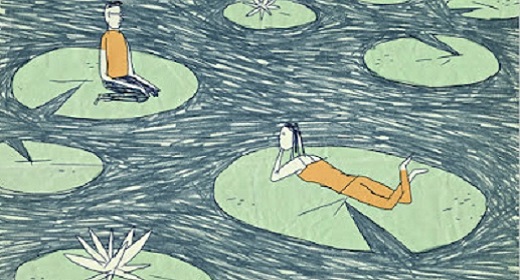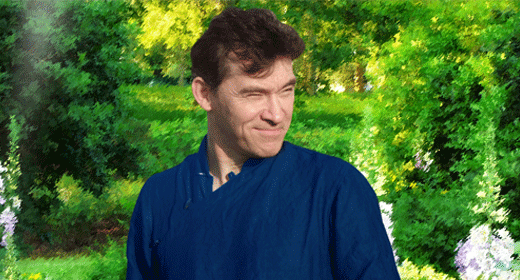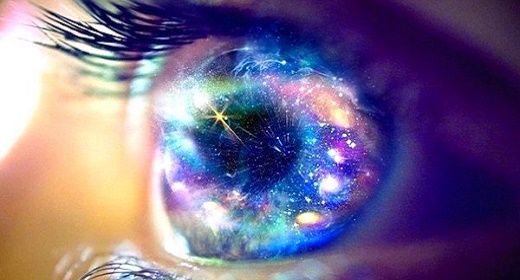Karen Maezen Miller: We have to reach the point where we are not yet ready to die…but we don’t really know how to live and survive

in our lives before we will really take the risk of doing something as radical as sitting down and doing nothing. That’s radical.
Donna Quesada: And yet, there is kind of a death in that. You are letting some other part of your life go because it didn’t work. And there is a kind of rebirthing experience in the act of sitting, isn’t there?
KAREN: Well, we say, not to go too far. The reality is that death is happening all the time, no matter what. We are rising up and settling down. If you consider even on a cellular level…really, if we look at some of the ancient texts…the 1000 year old texts that really look at the matter of what life is…it’s not this straight line. It’s not fixed or static. It’s changing all the time. And so, that is something that we have to come to grips with. What we think our life is…is yesterday. Who we think we are is not real and present in this moment. Everything is changing so fast. But when we sit down, we are surrendering. Sometimes it’s as simple as I’m going to surrender to my breath. I’m going to surrender to my butt because it’s going to support me. I’m going to surrender my attention deficit disorder to the time keeper who rings the bell…lots and lots of ways in which we remove ourselves physically from the driver’s seat because we know we are already headed for a fatal collision. So, we give up that false sense of control—which is already ruining our lives and causing harm to ourselves and everyone else. Something as simple as a quiet room and our breath.
Donna: Do you have to have a teacher to guide you through this process?
KAREN: I believe so. And the reason for that is the very thing we just talked about. We’re all very skilled and practiced at making ourselves comfortable. Finding our comfort zones. We’ll say, “Well, I’m a morning person.” Or, “I’m a night person.” Or, “I like to do this.” Or, “I don’t like to do that.” Or, “this works for me.” And… “something else doesn’t.” But, all of that is just the ego’s talk. The ego narrative of fear. A teacher always stands outside of yourself and your limitations. They are always there. So sometimes the teacher is like you right now in front of me. Or, your pet…your dog…your child…your boss. That’s the teacher standing outside of you calling for you to go beyond your comfort zone. Do more than what you thought you were able to do. But a teacher, generally, when they are selfless—which is really the chief characteristic of a teacher—simply serves as a mirror for you. And so, by selflessly, in full awareness, sitting naked as it were…without any agenda in front of you…you encounter yourself. You see all of your tricks and schemes and evasions. You see it. So, it’s really helpful.
Donna: You were saying a moment ago, that we are all kind of leaning toward collision, anyway. And so, there is this aspect of giving up control that comes through the art of practicing and surrendering. I remember you saying something once about the notion of settling. Someone said, “Well, isn’t that settling?”…when I can come to accept this, that I can’t control anyway…and accept that things are falling down…and I’m coming to a collision anyway…isn’t that just settling?” This always struck me as so interesting. There was something in you that wanted to say “No, no, it’s not settling.” But why isn’t it? Actually, it is settling and what’s wrong with settling? And is it pessimistic?
KAREN: I don’t know where you…terror strikes my heart when somebody says, “one time you said!…” But settling…we do. In our contemporary vernacular, settling always means settling for less. And those who are in the self improvement business and in the market business or whatever they are doing will always tell you, you deserve and you have to strive and never settle. And then it really strikes us as being contrary to ambition. But, if you will actually look at how a wave rises up and then, of course, you know what is going to happen to the wave. It settles back down. It settles. Does that wave lose anything? Where exactly is the loss in settling? In fact, in Buddhism we call the state of enlightenment…which I hate to bring up because it’s just another concept…but nonetheless, I will say that it is described as the settled mind of Nirvana. What is Nirvana? Nirvana is settling. Settling, in its even, undisturbed state. You see, the earth by nature is settled. In its place, the trees are settled. They don’t try to fly. The ants are settled. They don’t do back flips. Maybe they do…I don’t know, but you see, everything is settled in its place…in its position. It functions perfectly. Only the ego-centric mind, through its clever misapprehension of words, defines it in a way to feel like a lack or a loss.
Donna: Just another concept.
KAREN: Yes!
Donna: As you know, I teach at the college. And like every other decade, we have a lot of social problems that people are concerned about. And as a Buddhist priest, I think you must get this a lot…what I got the other day in the classroom…how do you reconcile this business of sitting down to meditate and doing your personal work? Learning how to settle and be at ease in your own life…which starts on the cushion…and you carry on into your garden and into your role as mother and all the other roles that you play in life…how do you reconcile that personal work with doing the work that we do or that we’re told we should do as citizens and as activists? How do we participate in the world in an active and useful way and is there a necessary tension there?
KAREN: There’s no tension. Who’s idea is it that one kind of activity prohibits or inhibits another?
Donna: Or comes at the expense of another.
KAREN: When it’s time to sit, you sit. When it’s time to march, you march. When it’s time to go out and vote…your life is your practice. Take care of what appears. Take care of what appears in front of you. And that is full engagement. When it’s time to write a letter, write a letter. When it’s time to visit with a friend, visit with a friend. When it’s time to walk the dog, walk the dog. When it’s time to say hello to your neighbor, say hello to your neighbor. Is that not citizenship?
Donna: That reminds me of a story and maybe this is an opportunity to ask you who is your teacher because your teacher was my teacher. In the Zen tradition, the teacher is called a Roshi. And I remember somebody asking Roshi once, “but I have to have goals…goals are what keep me alive and it’s what keeps me moving in life…I have to go to law school and I have to think of the future…” and, as you know, the whole emphasis is being here, now. But, I have to think of the future or else how will I plan my life and go forth as a lawyer and get my degree and do what it takes to mobilize this whole thing? And he said, “How do you become a lawyer? You fill out the application…you apply…you send it in.” And it was something like that. It was so simple…so disarmingly simple. “How do I fill out the application?” “You fill out the application.” And I think we make more out of this planning and doing. Even into the activism part of living then…maybe we are turning that into just another concept…
KAREN: It’s a sign that is so important that we see all the ways in which we blind and confuse and entrap and imprison ourselves just by the way we think. Our thinking is inherently dualistic. Don’t get confused by that word. In our thoughts, things are good or bad. They are now or then. They are right or wrong. Our thinking divides the world into opposition. And therefore, we think that it’s not possible to take care of everything. We think that if we sit…and so often we hear this, frankly, and these things get under my craw…I really want to write a sermon about it…this question about how irresponsible it is to sit in silence instead of “engaging” the world. But the reality is, once I empty this container, I am totally engaged. There is no separation. No divider. No wall. No gate between my life and the life of the universe. Everything I do either supports and enhances peace, harmony, compassion…or causes harm.
Donna: So just to play devil’s advocate for a minute. I’m the student. How…how does sitting in front of a wall constitute engagement?
KAREN: Because separation is an illusion. This is where it would really help if you took some of your kids that are really hard headed like that or as my student used to say, “head heavy”… too smart for their own good and suggest that before they take the Buddhist class, they take a physics class. Because in physics, they are going to take on faith. And they are going to memorize and they are going to believe and they will never object to the physicists view of the world, which is that this appearance, the way things appear in this form is an illusion. This is energy. It’s just all different wavelengths of energy. And just because it happens to appear right now like this doesn’t mean that this is what it is at its essence. I mean, in fourth grade science we learn about atoms and molecules. And we take that all in faith. But when it comes to changing the iron fisted way which we experience our lives, we refuse to connect the dots. This is empty. This is space. Nothing here is fixed. This is an illusion. And therefore since I am energy and you are energy—your pets will show you this—you will have an angry, negative fearful thought and your pet…am I right?
Donna: Absolutely, as a dog lover. I can tell you, absolutely.
KAREN: Alright. So do we think that is some special quality of the animal? No, this is me. What is going on here? Thankfully, I don’t have to be a physicist. I can just be an idiot. But I can see for myself that my own thoughts…the agitation in my own mind…can cause my daughter to slam her bedroom door. At least I can take responsibility for it. If I have a tumbling, fretful sleepless night…do you think there might be anyone else in the world who experiences that? I can guarantee you! That’s how central you are. You are the only one there. You think that what you do doesn’t matter? So, if I sit in repose…not contributing one scratch of discomfort…resentment…anger…disharmony…greed to this place…does that enhance life?
Donna: Absolutely.
KAREN: There you go. We can’t have these grandiose…Oh my god, I didn’t build a water treatment facility…I didn’t distribute earthquake relief. If I’m called to, perhaps I can and will. I take a vow. My life of practice, my awakened life…consists of taking care of whatever appears in front of me, where ever I am…no matter how I feel about it. When it’s time to raise my voice, I’ll raise my voice. And when it’s time to be still and quiet and bring peace. I’ll do that. Not one moment inhibits the next.
Donna: Thank you for that. There is a Zen teaching…I think I’m the first one to put it in print…the DER acronym. Don’t deceive yourself. Don’t make excuses. And, take responsibility. And you just spoke of taking responsibility and the many ways that we can take responsibility. And another question that I would like you to speak of, along the same lines, is this business of kind of falling into victim status…victim consciousness. And that’s one that gets my goat. I’d like you to speak about that. We see that so often in people as they go along their own spiritual path. They have a hard time getting past their own blocks because they feel victimized. Or even people who aren’t on a spiritual path. You just turn on the TV and you see it. You drive down the street and you see it. People feel victimized. People feel entitled. People feel they are blocked from whatever it is they are doing, spiritual or otherwise. As if there was a distinction! Because something has been done wrong to them.
And in this Buddhist teaching of taking responsibility, we are supposed to acknowledge our role in whatever it is that happened. What do you say to people when they say “but I really was done wrong?” My people, for example, were victims of a genocide. And…I personally was abused as a child. Or…this or that or the other. You hear these horrible stories. And people have gone through horrible things. It’s true! It’s all true! But how do we take responsibility and acknowledge that interconnectedness that you were just speaking of. There is no wall. We are all a part of it. And part of taking responsibility is acknowledging my role. How do you reconcile that in getting past the victim consciousness?
Read and Watch Part I Here: Awaken Interviews Zen Buddhist Priest Karen Maezen Miller Pt 1
Read and Watch Part III Here: Awaken Interviews Zen Buddhist Priest Karen Maezen Miller Pt 3









































